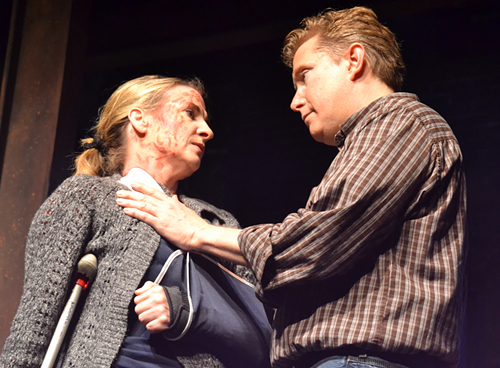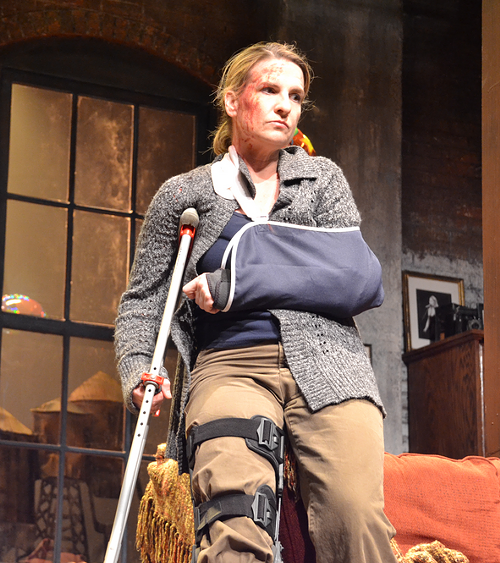
- William B. Young Photography
- He said, she said…
Talk about ballsy moves. Time Stands Still playwright Donald Margulies opens the second half of his politically-savvy play with a spot-on diatribe against the frustrating cultural function of politically-savvy plays.
James, a foreign correspondent (Michael Gravois) who’s spent his entire career/adult life documenting the atrocities of war complains about how Americans, of a certain class and disposition, go to see plays that reinforce previously existing worldviews and self-images. We go home basically unchanged, he argues, but feeling like we’ve meaningfully engaged with the world and its woes. Like driving with your headlights on to show you “support the troops,” these personally affirming, but hollow rituals, James suggests, make people feel like they are participating when they’re only consuming, and are more aligned with problems than with solutions.
As a nicely-imagined counterpoint to all of this Margulies has given James a new obsession. He’s becoming a critic, fascinated with bloody snuff-fluff cinema and convinced that the Saw series, and similar torture porn says something unexpected about the modern condition. He’s just not sure what, exactly.
Time Stands Still wallows in visceral sado masochistic pleasures. After James more or less reviews the first act of the play he lives in (potentially insulting a swath of the audience along the way) it’s difficult to experience the drama as anything but another kind of commodity. It’s difficult to not see selfishness and hypocrisy at the core of everything the main characters do. It makes arguably brave, intelligent, committed people look petty and small, and impossible to like as they pursue unique personal comforts like addicts, while managing more common obstacles like injury, insult, and infidelity. Normally, that might not be a good thing, and that’s why this play is special.
The play’s jabs at the audience, and the ritual of live performance are bracing and the big themes emerging in act one crumble as the political turns personal.
The basics: Set in an in a nice but neglected Brooklyn apartment Time Stands still chronicles the quickly evolving relationship between a small group of longtime friends, lovers, and ex-lovers.
James returns home to cope with the nervous breakdown he suffered after seeing one too many kids blown to bits. Sarah, a respected photographer, and James’ life partner (Leah Bray Nichols) follows shortly thereafter when her body is similarly ripped apart by a roadside bomb that kills her guide.
Sarah, the intellectual daughter of wealthy Southern Conservatives, is badly injured, permanently scarred, and grief stricken. She is entirely unable to imagine the kind of mundane upper middle-class life James is trying to embrace.
James and Sarah eventually formalize their relationship with marriage vows. They observe the ever-expanding happiness their old friend Richard (Barclay Roberts) seems to have found in his new, somewhat gooey, romance with a sweet, simple (and extremely young) woman (Katelyn Nichols). The previously unthinkable possibility of children is broached. But life is messy.

- William B. Young Photography
- Broken not beaten.
Margulies, who won a Pulitzer Prize for Dinner With Friends, has a gift for finding incredibly funny moments in incredibly dark and disturbing places. His most effective joke here is, perhaps, the one that never gets a laugh. Richard, a magazine photo-editor, is helping to create a coffee table book of Sarah’s photography. Because nothing speaks to the comforts of home and hearth like a beautifully made coffee table book full of severed limbs and phosphorous burns.
Over and over again Margulies pulls back the curtain on hollow social transactions, and the casual commercialization of foreign suffering by very extremely serious people who know the score and care deeply. Or something.
“You’re the Sid and Nancy of journalism,” Richard says to James and Sarah at one point. This Romantic grotesque couldn’t be a worse comparison. It is, however, a perfect example of how people in media instinctively, “sell the sizzle,” not the steak. Margulies, on the other hand, is trying very hard to move beyond the usual tropes of socially aware performance, to get a little closer to the red, red meat of things.
Deftly directed by Stephen Hancock, and beautifully performed, Time Stands Still is a great night of theater doing what theater does best. If you miss this Circuit Playhouse production, you’re missing one of the best and most provocative shows of the season.
To acquire tickets.